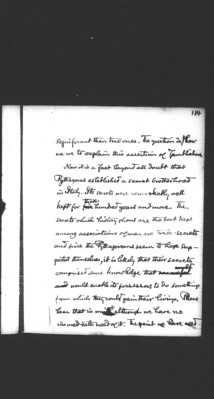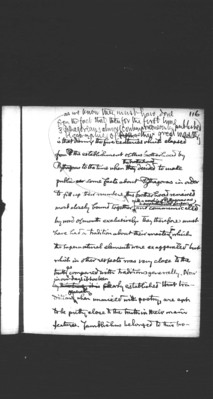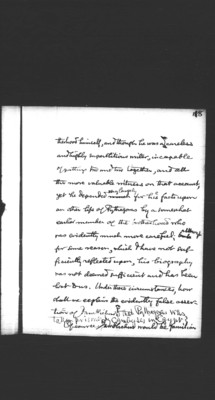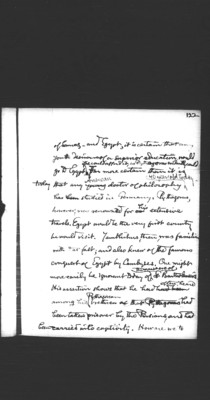Pages
66
114
significant than true ones. The question is, How are we to explain this assertion of Iamblichus.
Now it is a fact beyond all doubt that Pythagoras established a secret brotherhood In Italy. Its secrets were remarkably well kept for three hundred years and more. The secrets which history shows are the best kept among associations of men are trade-secrets and since the Pythagoreans seem to have supported themselves, it is likely that their secrets comprised some knowledge that would enable its possessors to do something from which they could gain their living. Please bear that in mind, although we have no immediate need of it. The point we have need
67
116
is that during the five centuries which elapsed from the establishment of this brotherhood by Pythagoras to the time when the brotherhood decided to make public some facts about Pythagoras in order to fill up their numbers, as we know they must have done from the fact that then for the first time 3 Pythagoreans almost contemporaneously published biographies of their great master, this brotherhood remained most closely bound together with a worship of Pythagoras as a supernatural person and communicated by word of mouth exclusively. They therefore must have had a tradition about their master in which the supernatural elements were exaggerated but which in other respects was very close to the truth, as compared with traditions generally. Now in our days it has been clearly established that traditions generally, when unmixed with poetry, are apt to be pretty close to the truth in their main features. Iamblichus belonged to this brotherhood
68
118
himself, and though he was a careless and highly superstitious writer, incapable of putting two and two together, and all the more valuable witness on that account, yet he depended very largely for his facts upon another life of Pythagoras by a somewhat earlier member of the brotherhood who was evidently much more careful; although for some reason, which I have not sufficiently reflected upon, his biography was not deemed sufficient and has been lost to us. Under these circumstances, how shall we explain the evidently false assertion of Iamblichus that Pythagoras was taken prisoner by Cambyses in Egypt?
Of course Iamblichus would be familiar
69
120
with the fact the Pythagoras had been in Egypt. The German higher critics never evinced their marvellous genius for blundering more than when they have cast a certain doubt on this fact, which is not only testified to by every writer from Plato down who ever uttered the name of Pythagoras, so that to this day, if a child asks its mamma who Pythagoras was, the first or second sentence of the reply will mention his being a great traveller. And aside from all testimony, it is a priori certain that Pythagoras would go to Egypt. For in the relative state of culture of Ionia where he was born in the island
70
122
of Samos,— and Egypt, it is certain that any youth desirous of a superior education would go to Egypt, if he could afford it, as Pythagoras evidently could. Far more certain than it is today that any American doctor of philosophy has studied in Germany. Pythagoras, however, was renowned for his extensive travels. Egypt would be the very first country he would visit. Iamblichus, then, was familiar with that fact; and also knew of the famous conquest of Egypt by Cambyses. One might more easily be ignorant today of the massacre of St. Bartholemew's. His assertion shows that he had often heard among his Pythagorean brethren that Pythagoras had been taken prisoner by the Persians, and had been carried into captivity. How are we to




